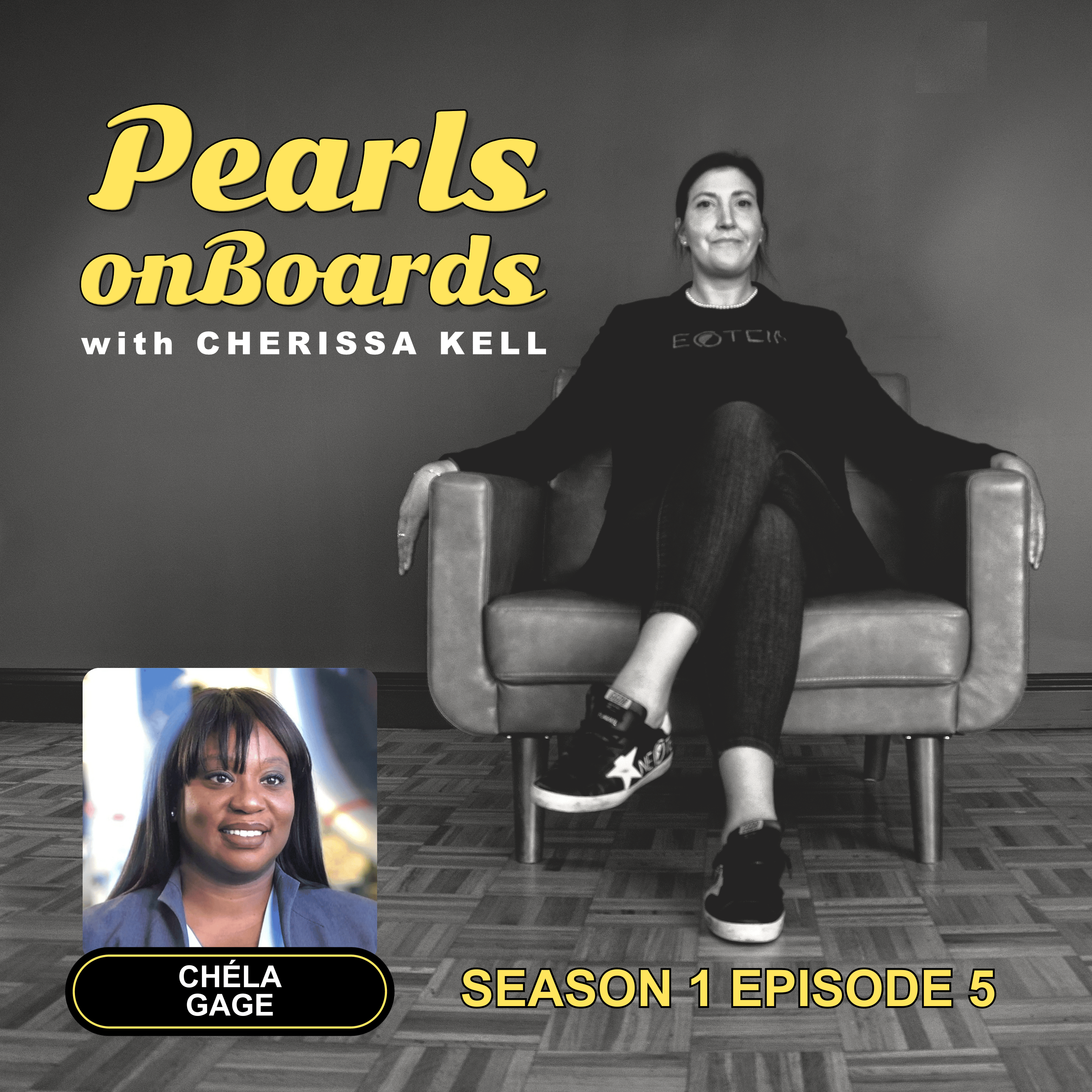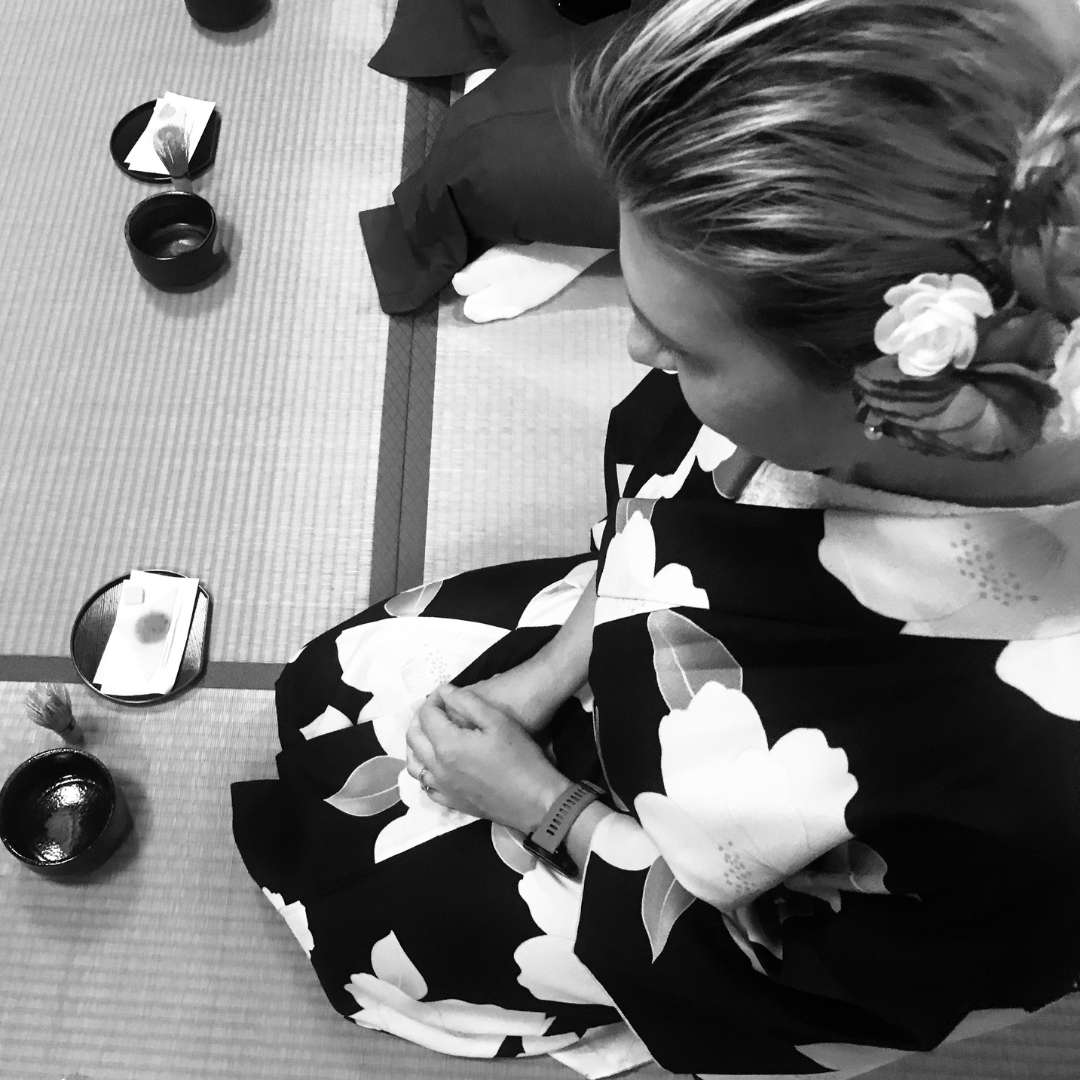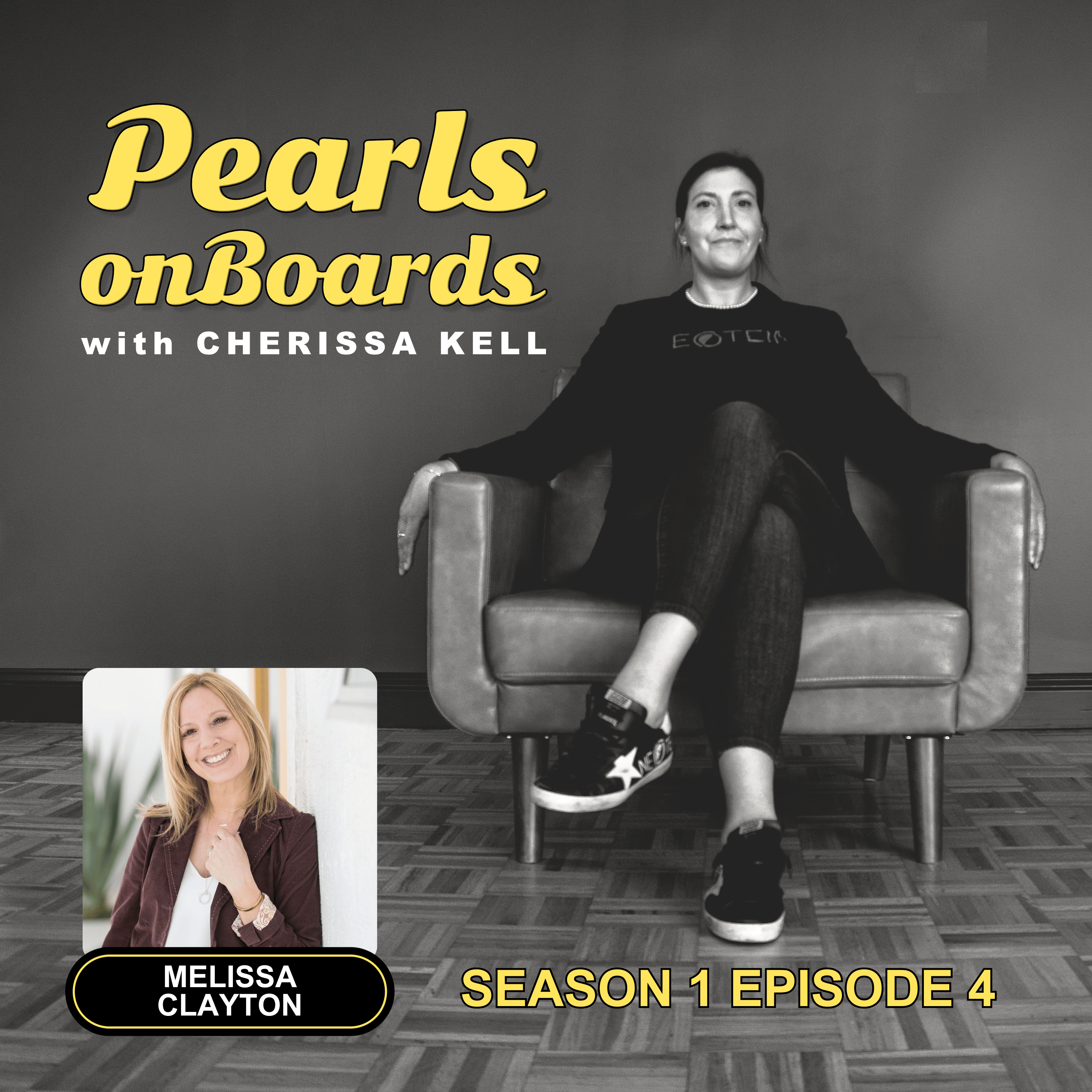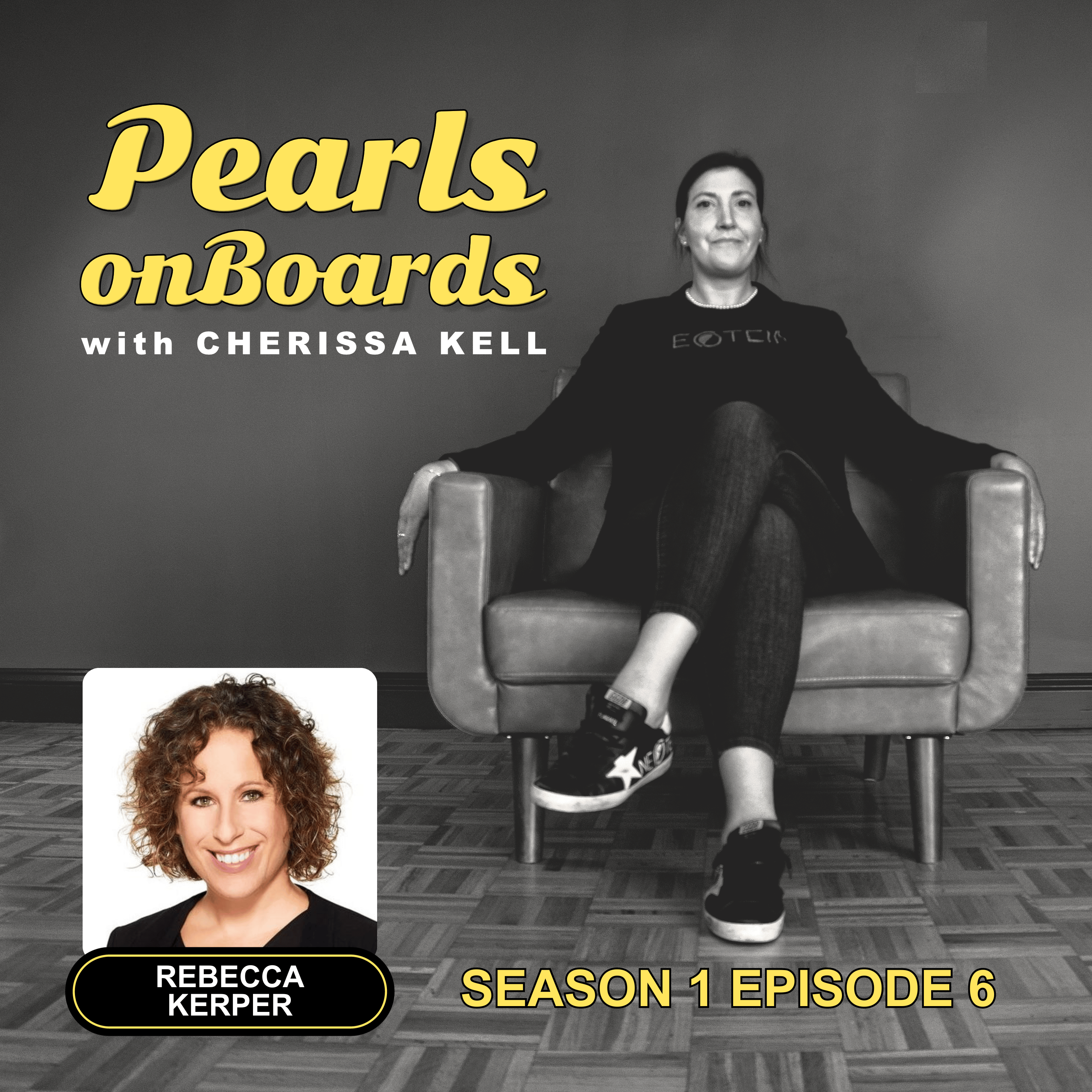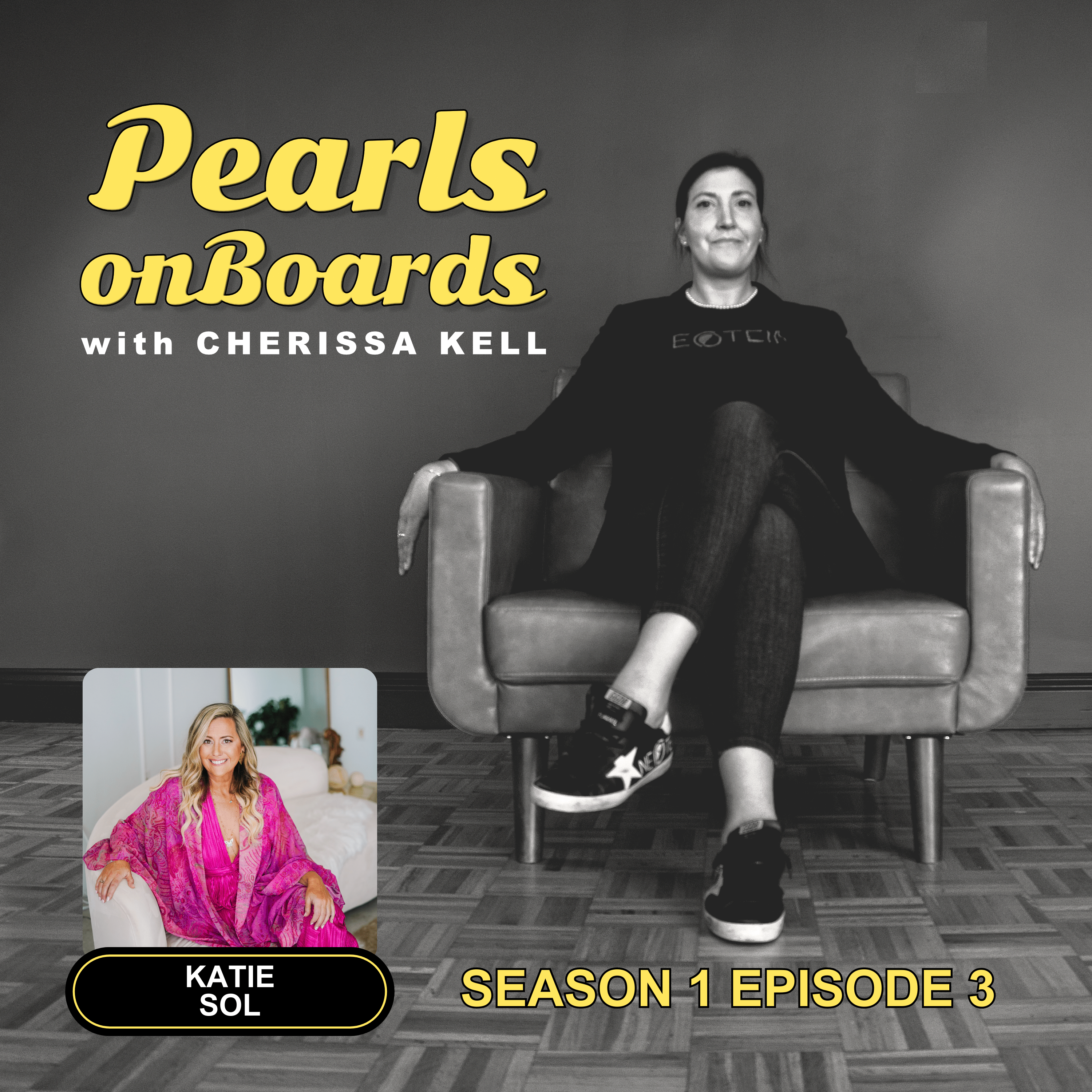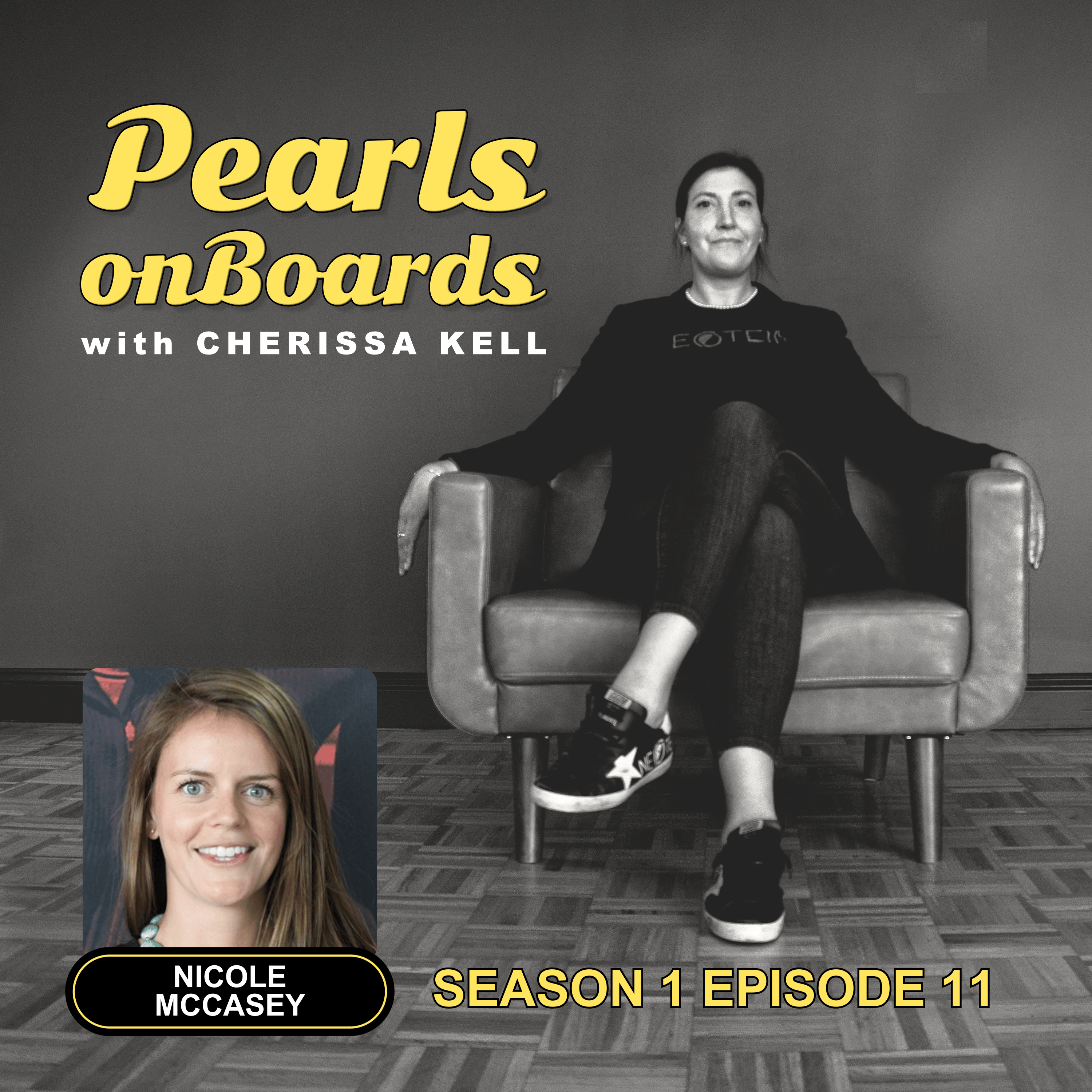Creating harmony between home life and work life can seem impossible, but Chéla Gage proved it’s possible to be a successful executive and an amazing parent! Tune in to hear Chéla's inspiring journey from foster care to the senior VP of Talent & Inclusion on this episode.
View Full Transcript
Episode Transcript
I tell my work what I'm doing. I tell my directs what I'm doing because a lot of them are women and I want them to see that I am making an effort to not. Disassociate my family from my work. I am making an effort to show you that you can own your power of being a mom. No one told me it was okay to be a good mom and a good leader.
Hello and welcome to this week's episode of Pearls onBoards. I'm so excited to sit down with chela gauge today chela is Currently the Senior Vice President of Talent and DEIB at Reformation. Chayla has more than 20 years of experience in talent and DEI and she is the proud mom of three boys. And we are so excited, to talk to her today and learn more about how she does it all.
Hey Chela, how are you today?
I am good. Thank you for having me.
Good. Yeah. Thank you for sitting down with me. So I am excited just to hear about you and your journey as a mom who's also doing incredible things in your career. 'cause I feel like very different to do it before you have children,
Yeah. I'll tell you a little bit about my story. So, um, It's amazing. My husband and I are coming up on our 20 year wedding anniversary.
And in reflection of that, I was thinking about, you know, the last 20 years and just, just the amazing. Experiences that my family and I have had over the last 20 years and my children are 18, 16, and nine. I have three boys. I was told that we couldn't have kids. And so my husband and I started our career journeys a little earlier. We started off as entrepreneurs before we had children.
You know, running your own business and being pregnant was just.
That was something that was a lot. That was a lot. And it was a difficult pregnancy. So my first two children I worked for a R P O organization and it, do all my work during their nap times and it's amazing. how much you can get done in 45 minutes.
Oh yeah. It's incredible
Yes.
Yes. it's amazing. And so I used to get my best work done when my kids were smaller because there was this, urgency and this fire to get everything done within a certain amount of time.
And so for my first two children, , up until they were like six or seven years old, it was just me and my husband back and forth He was always in a sales job, so he was gone during the day and most of my work I was able to do when he would get home at like two o'clock.
And so we had these off shifts and then the first time I became a leader, started taking it seriously and I remember the book One Minute Manager, that book, like it helped give me just little snippets of things to do to be a better leader.
And it started my self-help journey of trying to read everything that I could to become a better leader.
And I feel like My journey as a leader has helped me be a better mom. And as a mom, it's helped me be a better leader.
Like it's amazing how much as a mom, an empath. Like you, you put the feelings of others before yourself. I was able to see around corners, like It synced for me being a leader and being a mom. Were. are very much two important factors of my life. And I realized earlier on, because my husband and I had this way of managing our children and managing our careers, that I needed both to be integrated. And so , I remember Sheryl Sandberg's book Lean In, and I was so excited to read it and I. I was excited about her and like I was a part of a woman's e r g and she came to the women's e r g and were talking about her book , but reading it, it didn't fulfill me. it didn't feel like Her recommendations of success and her support system. I didn't have that.
I grew up in foster care and for the last 10 years of my life, from the age of seven to 17, I lived in 10 different homes. I don't have that familial support. I and my husband's family They're very supportive, but we ended up moving a lot throughout our careers, and so what I realized is I needed work and life to integrate and so I needed my employers. I needed my teammates. I needed my direct reports to know my home calendar as much as I needed my home calendar to know my work calendar.
And so that was real pivotal point of me understanding this is how I Chela Gage can have both, is they need to integrate. They cannot in any way be separate from me. Yeah. And I think it is, Hard when you don't have the resources to a way to integrate both worlds very seamlessly and be transparent with your team and your family so that. You can function at a high level and be present in both your work and your home life.
Yeah, it was of no benefit to keep one, a secret, but I realized, later on in my career, I had more autonomy and I had more confidence to, to really be forward with what my family needed. From my career, and I didn't have the roadmap in front of me. I didn't see anyone. The women that I had looked up to, I had heard nothing about their families.
Like they kept their lives separate and As I started moving up in my career, I started realizing I'm not the only female that has these aspirations, that, over the last 10 years, my family and I, we've moved six times in 10 years, and those six moves have elevated my career, but they've kind of, you know, Put a pause on my husband's career, and what I've seen is a lot of women who are in the C-suite who are senior level executives, Their partners or their spouses or their support really is supporting their career and their family, and without my husband being a champion of both, I wouldn't be in the seat that I'm in today.
Yeah. And I think that's stuff that people don't talk about enough, just to be honest and kind of why I wanted to do this. 'cause I heard a lot from women who were kind of in the infancy of being moms, right? They have these babies at home and they're like, I don't know how, I can't see, to get from here to Sheryl Sandberg.
I cannot see it. And people are only talking about what it's like to be here in the infancy of mom hood or what it's like to be at Cheryl's level. No one's talking about like, how do you get there? , I feel like what I hear over and over again is like you need that support within your immediate home, from your children, from your partner,
A hundred percent . I'm responsible for placing people or matching people in jobs basically, right? So when I had my own business, it was an executive search firm that focused on diversity placements, and I am raising three black boys.
What I love about the work that I do is I tell them all the time, What project I'm working on, what company I'm working for, what we're doing, and my boys have been able to connect our personal life with my work life because I am head of diversity, equity, and inclusion. And so in 2020 After the murder of George Floyd and all of the racial tension happening in the world, it was one time where my work and my life like just collided.
And I was grateful that I had raised my kids in a way that they had seen me. Manage work throughout their lives so that when 2020 came and I was in front of my computer hours a day instead racial tension was happening and I was having conference calls and dialogues and my sons had school at home and I was working from home and we were sitting right next to each other. They were asking questions about my work and it really felt like, okay, this is, my normal.
My normal is for them to understand what's going on, and for my work to understand, look, I'm raising three black boys and in a, period of racial trauma, I have to be ever present for them as well.
Yeah, I'm sure that that time period was kind of special as a mom to see it 'cause you have invited them on your journey as your, career unfolded. But for them to actually see in real time, like, wow, my mom's doing this like in real time.
yes. very important, meaningful work, not just for herself, but for us and our futures. And that's beautiful in the midst of an unbeautiful time. To be able to like,
A hundred percent. and that happened because you brought them along the whole time.
Yes. You don't know what you're doing when you're doing it. Right, And so hindsight, is a blessing. I do think that because I had a lack of familiar support, A lot of what I did throughout my career and in this, I call it the bridge period because it's exactly what you said.
There's a period of my career where my kids were like in elementary school, and my career was taking off, I just had promotion after promotion, after promotion. And what I realized in hindsight is my family and I, it was the core of us working on my career.
My family's from California. We moved from California to Arizona and then to Nevada and then to. Back to California, then to Connecticut, and then back to California. and then to Southern California. We went from Northern California to Southern California, and through all of those changes, I had to tell the kids, here's why Mommy's leaving this job.
Here's the next job that I'm going to, and here's the impact that it's going to have on you. And the last role that I took, my son was in a senior in high school, and I thought for sure that he was not going to wanna move. But this was the job of my dream. So me and my employer said, okay, I would do the commute.
From Northern Bay to Southern Bay, California. And when I told my son I was doing the commute, he said, but mom, that means we have less of you. And I said, yeah, but you get to stay in your senior year. No mom, we do this as a family. Like that's the moment where you're like, oh, I did something right.
There's this. Resiliency that children have that I am amazed at every time we put them into a situation and you see it, like I've seen my children grow. And I think I really am lucky that. It was truth, honesty, transparency that kept us sane as a family. you did more for them. Because you moved them than if you would've kept them somewhere. 'cause now they're gonna be more empathetic cause they're gonna be like, no, I get it. Like you know, this thing is important to you because it's important to your family.
And I get that 'cause I moved around and so I maybe, I don't understand why it's important to you, but I understand that it's important, they saw that, they experienced that in their lives. And I think that's huge to like expose them to humanity, you know?
What is amazing now is that you mentioned as you grow up and as you continue on in your career, things get a little easier. And that is so true because now I don't mind having my team over and having my family at the house. I'm feeding you all the same thing,
and in the middle of a team meeting, I will pick up a call from my son. I will do that today and everything that I do with my family, I tell my work what I'm doing. I tell my directs what I'm doing because a lot of them are women and I want them to see
that I am making an effort to not. Disassociate my family from my work. I am making an effort to show you that you can own your power of being a mom. No one told me it was okay to be a good mom and a good leader.
I thought I had to only show one, and now my current employer gets the best of me because I'm not apologetic about my children. out of the office for my son's graduation and I put my office on that. I am celebrating my son graduating high school.
I want organization to know that Your family is important because without our family's support, we can't do this.
It's not possible.
I feel like corporations would be so much more successful if they allowed this beautiful weaving of, being human at. Work . feel like once you become a mom, like my I somehow lost the title that I had at my job and I'm now like, I. Just a mom. And so you feel like as women, you have to separate the two so that you're taken seriously at work of a sudden you say you have a kid and everyone at work treats you like you're a. You know what I mean? And I don't know if that's what it is, like that women have been in the past afraid to share. 'cause there is such a distinct shift once your coworkers or your male counterparts find out you're a mom.
You know, there's also this connection with talent management I've seen, and a senior woman that I looked to as a mentor, as a guide, she called it the Mammy Syndrome, and at certain points she was getting feedback about her soft skills more, and she realized it after. She came back from maternity leave. It was, how do you make your team feel? It was less data points as far as she's driving the business. Whatever percentage it was, more of her team is leaving or her attrition rates. It was more soft skills focused, and she called it out to me, I started paying attention and what I started doing, being HR in those performance review meetings is calling it out to say, Hey, we're talking more about her soft skills and soft skills are important, but leaders get promoted based off of the impact to the business.
And so how are we showing her impact to the business versus her mommy skills?
Just because we are mommy's outside of work, it doesn't mean I want to be your mommy in this organization,
I don't wanna, I wanna have the same title that my men counterparts have, and I wanna be looked at for the value that I bring.
What would your advice be like for how they can enter that and kind of change the narrative so they are seen for their hard skills?
It is us, we have to start talking. It's our language.
It is how we communicate our successes. I tell every person that I mentor You should have a kudo sheet. Your resume needs to be updated with all of your accomplishments Even if you start a new job, 30 days into that new job, you need to be updating your resume every 30, 60, 90 days. That resume needs to be updated with your accomplishments because when it's time for your performance review, you want to talk about all of the great things that you've done, and you have to talk about it as if you are applying for a new job every single time.
It's what? Men do Totally. They toot their own horns all the time, then they have no problem. And I don't know why. We feel like we can't.
We apologize for being moms. We apologize for having a life outside of work
And I became unapologetic, my power shifted and that power, like I own it. I raised three children and I am a senior level
executive. I have A successful marriage, I have made business impacts, I've created business strategy, and I am a mom, and I own both of those with as much pride, like one doesn't outweigh the other.
I'm proud of them both. I've kind of had to just like reconcile that like, okay, my boys know who I am. they know what I'm doing. They see me in the trenches doing hard things and they know why I am doing it.
My husband gets it, like at the end of the day, There's gonna be people who love and hate me regardless of what I do, regardless of how I do it. there's so much freedom in that. And not to say like, I don't care. I do care. I want to make sure people feel a certain way when they're around me, but at the end of the day, like. I'm not gonna apologize for being successful. I'm not gonna apologize for doing hard great things. I'm not gonna apologize for being efficient with my time.
I'm gonna go out there and maybe I'll look like a hard ass at work. And, at home I'm super lovey and nurturing. Like I don't care if people at work think about my hard ass 'cause that's my role at work, yes. And I think in our workforce there's this expectation for women for us to behave a certain way or for us to To be soft I used to hear the phrase, I don't hear it anymore. Thank goodness. Rough around the edges.
She's rough around the edges.
I used to be told that. I got told she's rough around the edges as well as executive presence, which executive presence just means you don't look or act like the majority. And I've given, that away, but. As women, we also have this need to please and that need to please makes us a little more apologetic than others, and that need to please is sometimes holding us back. There's a book that I read by Tiffany Dufu called Drop the Ball, and she talks about like how as women we are Given as much trials and tribulations as men, but we feel like we have to keep all of the plates spinning. Everything has to be perfect. And what she's saying is some balls aren't yours to own.
Or if it is not at this time, drop the ball. The world will not end Understanding when to let go, when to ask for help, just makes you a better leader.
It does. My husband's a former special operator in the Army and their rule was like, you have 40% of the solution execute. And it's kind of one of those things like, is everyone gonna do it exactly the same way you're gonna do it?
Nope. But ultimately, does that matter? it doesn't, if you're. Delegating that responsibility and they're not ruining
the task or the quality of the task. It doesn't matter how it gets done. And I think that is true. Like you learn at home how to relinquish so that you can be better at your job, but that then empowers you at your job to relinquish, which then helps you at home 'cause now you can be home more, you know? And
Exactly, One helps the other. there was one leader I had, her name was Maureen, and when I found out that Maureen's husband was a stay-at-home dad, it was like, Where have you been? All my life.
Like I have not heard of another stay at home dad of a woman in a C-suite.
And she was a C H R O and so she, you had a lot of successes along her career and, I was like, it would've been nice to hear of her story
when I was in the throes of the middle school, the elementary school, just in the throes of raising the kids.
It would've been nice to know I'm not alone.
Yeah. And I think that's, 'cause mom guilt is real, but I think mom guilt is real. 'cause other moms aren't sharing what they're feeling guilty about or like what their resources are, you know? And so , I just think like being open about our process and like our experiences is so helpful to empower the younger women or, you know, maybe not even younger, but at different stages who are wanting to succeed. Like it gives them hope,
Like a lot of us were trying to figure it out. and. think being able to like, share that is so important, you
Yeah, that's why when I saw your podcast of really talking to moms and talking about what it's like to be in the C-suite, I wanted to. Just share because I didn't see this as I was raising my kids, and it would've been really nice to know that I there's a roadmap and there's a blueprint to how this is done.
I say have your vision board. Have your North star for your career of where you wanna go, and then build the support system of your dreams, and understand what that support system is. If it's your spouse, if it's your sister, your aunts, your best friends know that. It will take a village to help your career get to where you want it to go to, but it is so worth it. Everyone that helps you along the way will be a better person because of it.
Yeah. I love it.
Thank you for sharing.
